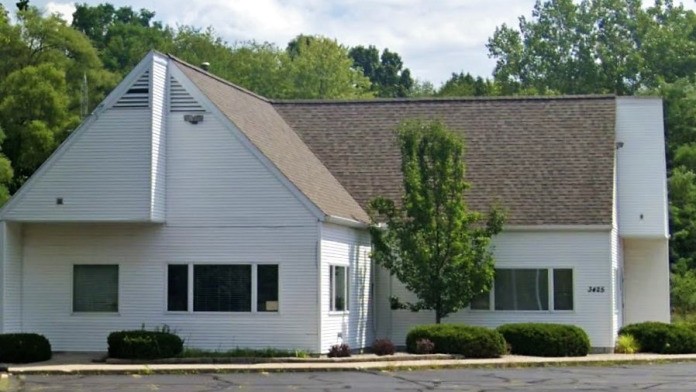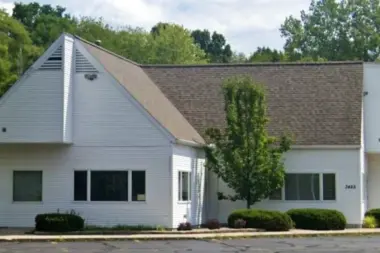About Catholic Charities of Jackson Lenawee and Hillsdale Counties
Catholic Charities of Jackson Lenawee and Hillsdale Counties in Jackson, Michigan, offers outpatient services designed to support you and your child through substance use disorders and mental health challenges. You’ll find individual, family, and marital therapy led by master’s level therapists who truly listen. What strikes us most about this center is their specialized approach for children, including play therapy and trauma informed care, to help them express what they cannot yet say in words.
The Bridges to Recovery program is unique in its team based support, including peer advocates and case managers who work alongside you and your child. Their Michigan Department of Corrections Substance Use Disorder Program provides education and treatment groups tailored for probation and parole clients. We like that they accept many forms of payment, including Medicare, Medicaid and private insurance and offer a sliding fee scale to fit your financial needs.
Jackson has some peaceful places to visit after your appointments that can help you relax and recharge. Cascades Park has its beautiful illuminated waterfall with beautiful walking trails. Ella Sharp Park provides gardens and a museum where you and your child can enjoy nature and culture close by.
Child and Family Services in Your Community
The center provides care for children and adolescents, especially those in foster care, using play therapy to help children process trauma safely. We like that parents and families are welcomed for therapy sessions that strengthen connections and communication. You can feel confident bringing your children here because they are given special attention that’s individualized to their specific needs.
Accessible Care for Adults and Seniors
If you’re experiencing difficulties like anxiety or depression, you’ll find a compassionate care team eager to support you. The programs are designed to fit adults and seniors with various life experiences. The professional staff are praised for their kindness and understanding in client reviews, which shows their commitment to helping you heal.
Rehab Score
Gallery


Accepted Insurance
Other Forms of Payment
Medicaid is a state based program that helps lower-income individuals and families pay for healthcare. Medicaid covers addiction treatment so those enrolled can use their coverage to pay for rehab. When a program accepts Medicaid the client often pays very little or nothing out of their own pocket.
Private insurance refers to any kind of healthcare coverage that isn't from the state or federal government. This includes individual and family plans offered by an employer or purchased from the Insurance Marketplace. Every plan will have different requirements and out of pocket costs so be sure to get the full details before you start treatment.
Self-pay involves paying for treatment out of your own pocket. You can use savings or credit, get a personal loan, or receive help from family and friends to fund your treatment. If you don't have insurance or your insurance plan doesn't cover a specific program, self-pay can help ensure you still get the care you need.
Financial aid can take many forms. Centers may have grants or scholarships available to clients who meet eligibility requirements. Programs that receive SAMHSA grants may have financial aid available for those who need treatment as well. Grants and scholarships can help you pai for treatment without having to repay.
Sliding scale payments are based on a client's income and family size. The goal is to make treatment affordable to everyone. By taking these factors into account, addiction recovery care providers help ensure that your treatment does not become a financial burden to you or your family, eliminating one barrier to care.
Medicare is a federal program that provides health insurance for those 65 and older. It also serves people under 65 with chronic and disabling health challenges. To use Medicare for addiction treatment you need to find a program that accepts Medicare and is in network with your plan. Out of pocket costs and preauthorization requirements vary, so always check with your provider.
Military members, veterans, and eligible dependents have access to specific insurance programs that help them get the care they need. TRICARE and VA insurance can help you access low cost or no cost addiction and mental health treatment. Programs that accept military insurance often have targeted treatment focused on the unique challenges military members, veterans, and their families face.
Addiction Treatments
Levels of Care
Outpatient Programs (OP) are for those seeking mental rehab or drug rehab, but who also stay at home every night. The main difference between outpatient treatment (OP) and intensive outpatient treatment (IOP) lies in the amount of hours the patient spends at the facility. Most of the time an outpatient program is designed for someone who has completed an inpatient stay and is looking to continue their growth in recovery. Outpatient is not meant to be the starting point, it is commonly referred to as aftercare.
Treatments
The goal of treatment for alcoholism is abstinence. Those with poor social support, poor motivation, or psychiatric disorders tend to relapse within a few years of treatment. For these people, success is measured by longer periods of abstinence, reduced use of alcohol, better health, and improved social functioning. Recovery and Maintenance are usually based on 12 step programs and AA meetings.
Drug rehab in Michigan provides personalized treatment to help individuals break this cycle and regain control of their lives. Treatment methods are used in various levels of care, including inpatient rehab, partial hospitalization programs, intensive outpatient programs, and standard outpatient treatment.
Many of those suffering from addiction also suffer from mental or emotional illnesses like schizophrenia, bipolar disorder, depression, or anxiety disorders. Rehab and other substance abuse facilities treating those with a dual diagnosis or co-occurring disorder administer psychiatric treatment to address the person's mental health issue in addition to drug and alcohol rehabilitation.
A combined mental health and substance abuse rehab has the staff and resources available to handle individuals with both mental health and substance abuse issues. It can be challenging to determine where a specific symptom stems from (a mental health issue or an issue related to substance abuse), so mental health and substance abuse professionals are helpful in detangling symptoms and keeping treatment on track.
Opioid rehabs specialize in supporting those recovering from opioid addiction. They treat those suffering from addiction to illegal opioids like heroin, as well as prescription drugs like oxycodone. These centers typically combine both physical as well as mental and emotional support to help stop addiction. Physical support often includes medical detox and subsequent medical support (including medication), and mental support includes in-depth therapy to address the underlying causes of addiction.
Programs
Adult rehab programs include therapies tailored to each client's specific needs, goals, and recovery progress. They are tailored to the specific challenges adult clients may face, including family and work pressures and commitments. From inpatient and residential treatment to various levels of outpatient services, there are many options available. Some facilities also help adults work through co-occurring conditions, like anxiety, that can accompany addiction.
Young adulthood can be an exciting, yet difficult, time of transition. Individuals in their late teens to mid-20s face unique stressors related to school, jobs, families, and social circles, which can lead to a rise in substance use. Rehab centers with dedicated young adult programs will include activities and amenities that cater to this age group, with an emphasis on specialized counseling, peer socialization, and ongoing aftercare.
Clinical Services
Whether a marriage or other committed relationship, an intimate partnership is one of the most important aspects of a person's life. Drug and alcohol addiction affects both members of a couple in deep and meaningful ways, as does rehab and recovery. Couples therapy and other couples-focused treatment programs are significant parts of exploring triggers of addiction, as well as learning how to build healthy patterns to support ongoing sobriety.
Expressive Arts include activities such as music, art, creative writing, and creative dramatics. Studies indicate that Expressive Arts will assist healing from trauma by providing opportunities to share experiences in an empathetic environment through expressing emotions in a creative process. Expressive Arts allow children to develop self-awareness, reduce stress, and accelerate psychological and physical healing.
Eating disorders include anorexia, bulimia, binge eating, and dysfunctional eating patterns. Many psychologists and other mental health professionals consider eating disorders to be food addictions, meaning food is being used in an addictive way (similar to drug or alcohol addiction). Certain substance abuse treatment programs will have treatment for eating disorders as one of the services offered. An eating disorder may also present as a co-occuring disorder or dual diagnosis alongside drug and alcohol addiction.
In Equine Assisted psychotherapy (EAP), children interact with horses in activities such as grooming, feeding, walking, and games. Work with the horse supports and encourages the identification and expression of feelings. Children are often unaware of their barriers and behavior until they can understand it through the way in which the horse relates it back to them. EAP can serve as a first step in helping them break through these barriers and become more comfortable. Once the barriers are removed, EAP offers children with emotional and behavioral issues a safe environment in which to work through issues of fear, anxiety, self-doubt, and poor communication.
Experiential therapy is a form of therapy in which clients are encouraged to surface and work through subconscious issues by engaging in real-time experiences. Experiential therapy departs from traditional talk therapy by involving the body, and having clients engage in activities, movements, and physical and emotional expression. This can involve role-play or using props (which can include other people). Experiential therapy can help people process trauma, memories, and emotion quickly, deeply, and in a lasting fashion, leading to substantial and impactful healing.
Research clearly demonstrates that recovery is far more successful and sustainable when loved ones like family members participate in rehab and substance abuse treatment. Genetic factors may be at play when it comes to drug and alcohol addiction, as well as mental health issues. Family dynamics often play a critical role in addiction triggers, and if properly educated, family members can be a strong source of support when it comes to rehabilitation.
Group therapy is any therapeutic work that happens in a group (not one-on-one). There are a number of different group therapy modalities, including support groups, experiential therapy, psycho-education, and more. Group therapy involves treatment as well as processing interaction between group members.
In individual therapy, a patient meets one-on-one with a trained psychologist or counselor. Therapy is a pivotal part of effective substance abuse treatment, as it often covers root causes of addiction, including challenges faced by the patient in their social, family, and work/school life.
For an adult, adolescent, or child, talking about trauma is terrifying and intimidating. With grant funding from the Adrian Dominican Sisters and Raskob Foundation, Therapist Pam Millenbach, OP, works with children in foster care to provide specialized services to treat trauma/PTSD and attachment issues in children. Services they provide for the families and foster children are equine-assisted (horse) therapy at a horse-rescue farm and music and drama classes at Siena Heights University.
Amenities
-
Private Setting
Staff
Daniel Bishop
President
Contact Information
3425 Francis Street
Jackson, MI 49203





